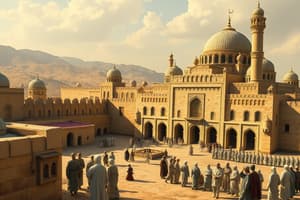Podcast
Questions and Answers
What is the primary subject of Arab history?
What is the primary subject of Arab history?
- Modern Arabic literature
- Ancient Arabic civilization (correct)
- Islamic studies
- Middle Eastern politics
Which of the following is most closely related to Arab history?
Which of the following is most closely related to Arab history?
- Mesopotamian Civilization
- Ancient Egyptian History
- Persian Empire
- Ottoman Empire (correct)
What is the primary focus of Middle Eastern politics?
What is the primary focus of Middle Eastern politics?
- Conflict resolution
- Regional governance (correct)
- International relations
- Economic development
What is a key aspect of understanding Arab history and Middle Eastern politics?
What is a key aspect of understanding Arab history and Middle Eastern politics?
What is a common thread between Arab history and Middle Eastern politics?
What is a common thread between Arab history and Middle Eastern politics?
Which caliphate was based in Damascus?
Which caliphate was based in Damascus?
Who is often associated with Pan-Arabism?
Who is often associated with Pan-Arabism?
What was a major factor in shaping Arab history and politics?
What was a major factor in shaping Arab history and politics?
Which city was the capital of the Abbasid caliphate?
Which city was the capital of the Abbasid caliphate?
What has been a long-standing issue in Middle Eastern politics?
What has been a long-standing issue in Middle Eastern politics?
Flashcards are hidden until you start studying
Study Notes
Arab History
- The Arab world has a rich and diverse history spanning over 1,500 years, influenced by Islamic conquests, Ottoman Empire, and European colonialism.
- The Arab Empire, established in the 7th century, was the first major Islamic empire, stretching from Spain to India.
- The Abbasid Caliphate (750-1258 CE) was a golden age of Islamic culture, marked by significant scientific, literary, and artistic achievements.
Middle Eastern Politics
- The modern Middle East was shaped by the Sykes-Picot Agreement (1916), which carved up the region into spheres of influence for Britain and France.
- The Arab-Israeli conflict, rooted in the displacement of Palestinians in 1948, remains a central issue in regional politics.
- The Iranian Revolution (1979) and the Iraq-Iran War (1980-1988) significantly impacted the region's political landscape.
Arab History and Middle Eastern Politics
- The Arab world has a rich history dating back to the 7th century, with the rise of Islam as a major turning point.
- The Middle East has been a hub of political activity, with various empires and dynasties rising and falling throughout history.
Umayyad Caliphate (661-750 CE)
- The Umayyad Caliphate was the first great Islamic empire, established by Muawiyah I in 661 CE.
- Its capital was Damascus, and it stretched from modern-day Iran to Spain.
- The Umayyads were known for their administrative and architectural achievements, including the construction of the Dome of the Rock in Jerusalem.
Abbasid Caliphate (750-1258 CE)
- The Abbasid Caliphate was the second great Islamic empire, established by Abu al-Abbas in 750 CE.
- Its capital was Baghdad, which became a center of learning, culture, and trade.
- The Abbasids were known for their patronage of scholars, scientists, and poets, leading to a golden age of Islamic civilization.
Gamal Abdel Nasser (1918-1970)
- Gamal Abdel Nasser was an Egyptian politician who served as President of Egypt from 1956 to 1970.
- He was a key figure in the Arab nationalist movement, advocating for pan-Arabism and unity among Arab states.
- Nasser's policies, including nationalization of the Suez Canal and establishment of the United Arab Republic, had significant impacts on the Middle East and beyond.
Pan-Arabism
- Pan-Arabism is a political ideology that advocates for the unity and integration of Arab states.
- It emerged in the 19th century, with the goal of creating a unified Arab state.
- Pan-Arabism has been influenced by various movements, including nationalism, socialism, and Islamism.
Palestine and Colonialism
- Palestine has been a contested territory throughout history, with various empires and powers vying for control.
- The modern Palestinian national movement emerged in the early 20th century, in response to Zionist immigration and British colonial rule.
- The legacy of colonialism continues to shape the politics and economy of the Middle East, with ongoing debates over issues such as borders, sovereignty, and self-determination.
Studying That Suits You
Use AI to generate personalized quizzes and flashcards to suit your learning preferences.



